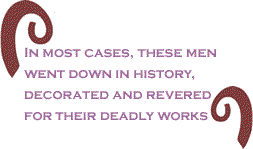
|
|||||||||||||||||||||
|
||||||||||
|
The current issue is always free to everyone If
you need the access available to a |
||||||||||
 |
||||||||||
 |
||||||||||
Thirty-five years ago, the covers were pulled off the Tuskegee syphilis experiment conducted by the Macon County Public Health Service (PHS). The 40-year experiment allegedly was set up to study the impact of untreated syphilis on some 600 black men, about 200 in a control group, beginning in 1932. Although it certainly wasn’t the first or last of racist experiments on black people, historian James Jones and author of Bad Blood has described as "the longest non-therapeutic experiment on human beings in medical history." In her book, Medical Apartheid, Harriet Washington explores the “dark history of medical experimentation on black Americans, from colonial times to the present.” Washington gives numerous examples of lesser-known experiments on black men, women and children by men of science and medicine. In most cases, these men went down in history, decorated and revered for their deadly works. The notorious Tuskegee “research” was the brainchild of “The Syphilis Men”: Drs. Taliaferro Clark, Oliver Wenger, John Heller and Raymond Vonderlehr. They were the liberal minds of that day, so I can’t imagine what would have happened if the good doctors had been avowed racists. To avoid the racist label, the project needed - and received - the support of a black institution and its prominent doctors. Both Dr. Robert Moton, President of Tuskegee Institute and Dr. Dibble, head of the John Andrew Hospital at the Institute, enthusiastically signed off on the reprehensible project. Dibble proudly anticipated the hospital and the Institute would “get credit for this piece of research work." There were other notable African-Americans attached to the project. Sociologist Charles Johnson did a study of the county’s black residents, to provide the baseline data for the experiment.
Macon County, Alabama was chosen as the site of the study because of the high rate of the venereal disease as well as the accompanying high rates of illiteracy and poverty. When the black men came to the clinic to be treated and were found to be infected, they were siphoned off to be part of the infamous study for their “bad blood”. The goal was never to treat them but to keep them in the program until death, where their real value would finally pay off with the data collected from the autopsies. In return for their participation in the study, the men were given free medical exams, free meals and free burial insurance. The word free should definitely be in quotes because there was nothing free here, as many paid the ultimate price. The symptoms of syphilis in its advanced, untreated stages are general ill feelings, muscle aches, joint pain, enlarged lymph nodes and hair loss. Because the disease affects the cardiovascular and central nervous systems, the men were subject to aneurysms, heart disease, blindness, paralysis, insanity and other debilitating conditions. Even when penicillin was developed as the accepted cure for syphilis in 1947 and even when some of the men enlisted to serve in World War II, treatment was still denied. Eunice Rivers had a unique role in this shameful project. She is often portrayed as a helpless pawn or it would be said that her behavior was justified for the historical period, i.e. a black nurse did what white doctors told her to do. For me, Nurse Eunice Rivers was the most despicable player in the game. Rivers was the only one who stayed the duration of the project, choosing to continue even after she retired. She was given the opportunity to take a job in New York City but rejected it, opting instead to be used by the project. Nurse Rivers carried out the invaluable role of winning the trust of the men and their families and keeping them involved through a series of trickery and incentives. She passed on personal and family information to doctors, along with black cultural nuances, to exploit as the study saw fit. She was so trusted that the men would come to her for advice not related to the study.
Apparently, Missy Rivers starting to get full of herself. The research project came to be known as “Miss Rivers Lodge.” The good ole' boys let her sign off on some of their public reports and she’s even been photographed with the white doctors, appearing to look like an equal colleague. Rivers pumped these black guinea pigs up with the notion that they were special because the men were participating in an important government project. The Tuskegee subjects would often be seen waving to friends from Miss Rivers’ fancy “guvment” van on the way to receiving their fake treatment of pink aspirin. The story finally broke in the Washington Star in 1972, based upon information from whistleblower, Peter Buxtun, a former PHS employee. Buxton was a young, Polish immigrant who ended up doing interviews for the study. Once he found out the real deal, he started writing letters to the higher-ups in the health department, pleading for them to stop the project. During his stint at law school, he continued to write the letters, trying to get the attention of those in authority, until it was clear that his words were falling on deaf ears. That’s when he went to the media. The wonder of the Tuskegee experiment was that it was not exactly a secret. While the men, their families and their communities knew nothing of the contemptible research, many in the medical field did. There were periodic reports on the study to the broader medical community. There was never an active intervention by any of those who read the reports or from those who worked in the public health sectors of county, state and federal government. There were also benefactors involved such as the Rosenwald Fund and Milbank Memorial Fund, who underwrote various aspects of the project. They should all go down in history as co-conspirators to commit murder. By the abrupt end of the experiment in 1972, nearly 30 of the men had died directly of syphilis, 100 were dead of related complications, 40 of their wives had been infected, and 19 of their children had been born with congenital syphilis. Ultimately, the study had no redeeming scientific outcomes that could be used for the greater good of society. In 1997, then President Clinton issued a formal apology to the survivors and their families, yet all the main characters associated with carrying out the mission of the Tuskegee experiment went to their graves unrepentant and unremorseful about their participation. The families of survivors received compensation from a class action suit filed on their behalf. The physical, psychological and emotional pain and suffering of the men and the families who had to watch them deteriorate is incalculable and no dollar amount is adequate. In the wake of the Clinton apology, Tuskegee University received funds for their National Center of Bioethics. I want to believe that it represents something good coming from evil but thinking of the profound suffering of the Macon County families, there’s not much comfort in trying to make such a reconciliation.
The Tuskegee syphilis experiment is an enduring stain on human medicine. The mistrust of African-Americans toward the medical industry, as well as the government, remains steadfast and justifiable. It was no surprise that when AIDS hit the scene, a poll showed that a sizeable sector of African-Americans believed that the disease was man-made. Most sadly, it is the poor and uneducated whose health prognosis is bleaker than their counterparts. It is that class who sometimes makes a conscious choice not to go to a doctor or refuses to take medication. The medical industrial complex has proven that poor folks aren’t the only ones who should expect to get a raw deal. Their equal opportunity approach has been duly documented in Michael Moore’s documentary Sicko. The African-American community must find ways to address medical accountability, healthcare inequities and other impediments to achieving a healthy body and mind. For radicals, our revenge or duty - whichever one motivates you more - is to be models of healthy lifestyles. Live longer to fight longer. That is a radical act in a capitalist society. |
||||||||||
| August
9, 2007 Issue 241 |
|
| Printer Friendly Version in resizeable plain text format format |
 |
 |
 |
| |
| |


































